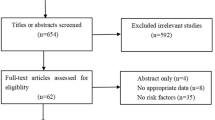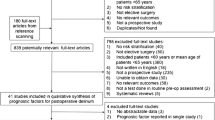Abstract
Background
A total of 4.5–41.2% of orthopedic surgery patients experience delirium. Until now, no formal systematic review or meta-analysis was performed to summarize the risk factors of delirium after orthopedic surgery.
Aims
The present study aimed to comprehensively and quantitatively conclude the risk factors of delirium after orthopedic surgery in elderly patients.
Methods
A search was applied to Medline, Chinese National Knowledge Infrastructure (CNKI), Embase, and Cochrane central database (all up to February 2020). All studies on the risk factors of delirium after orthopedic surgery in elderly patients without language restriction were reviewed, and qualities of included studies were assessed using the Newcastle–Ottawa Scale. Data were pooled and a meta-analysis was completed.
Results
A total of 15 studies altogether included 10,053 patients with orthopedic surgery, 825 cases of delirium occurred after surgery, suggesting the accumulated incidence of 8.2%. Results of meta-analyses showed that age > 70 years (odds ratio (OR) 3.78, 95% confidence interval (CI) 2.97–4.80), advanced age (standardized mean difference 0.82, 95% CI 0.54–1.09), male sex (OR 1.78, 95% CI 1.13–2.79), medical comorbidities (OR 2.18, 95% CI 1.23–3.88), malnutrition (OR 3.10, 95% CI 2.19–4.38), preoperative and postoperative haemoglobin (SMD − 0.37, 95% CI − 0.54 to − 0.19; SMD − 0.33, 95% CI − 0.55 to − 0.11), postoperative sodium (SMD − 0.52, 95% CI − 0.74 to − 0.29) and longer hospitalization after surgery (SMD 0.27, 95% CI 0.11–0.43), hearing impairment (OR 2.78, 95% CI 1.98–3.90), multiple medications (OR 1.36, 95% CI 1.21–1.52), psychotic drugs(OR 4.27, 95% CI 1.37–13.24), morphine (OR 1.97, 95% CI 1.11–3.51), cognitive impairment (OR 2.72, 95% CI 1.96–3.78), length of stay (SMD 0.26, 95% CI 0.14–0.39) and hip surgery (OR 1.63, 95% CI 1.08–2.48) were more likely to sustain delirium after hip surgery in elderly patients. ASA I and II was less likely to develop delirium after orthopedic surgery (OR 0.52, 95% CI 0.34–0.79).
Conclusions
Related prophylaxis strategies should be implemented in the elderly involved with above-mentioned risk factors to prevent delirium after orthopedic surgery.







Similar content being viewed by others
References
van Meenen LCC, van Meenen DMP, de Rooij SE et al (2014) Risk prediction models for postoperative delirium: a systematic review and meta-analysis. J Am Geriatr Soc 62:2383–2390. https://doi.org/10.1111/jgs.13138
Yang Y, Zhao X, Dong T et al (2017) Risk factors for postoperative delirium following hip fracture repair in elderly patients: a systematic review and meta-analysis. Aging Clin Exp Res 29:115–126. https://doi.org/10.1007/s40520-016-0541-6
Song KJ, Ko JH, Kwon TY et al (2019) Etiology and related factors of postoperative delirium in orthopedic surgery. Clin Orthop Surg 11:297–301. https://doi.org/10.4055/cios.2019.11.3.297
Hong N, Park JY (2018) The motoric types of delirium and estimated blood loss during perioperative period in orthopedic elderly patients. Biomed Res Int 2018:9812041. https://doi.org/10.1155/2018/9812041
Williams-Russo P, Urquhart BL, Sharrock NE et al (1992) Post-operative delirium: predictors and prognosis in elderly orthopedic patients. J Am Geriatr Soc 40:759–767. https://doi.org/10.1111/j.1532-5415.1992.tb01846.x
Marcantonio ER, Flacker JM, Michaels M et al (2000) Delirium is independently associated with poor functional recovery after hip fracture. J Am Geriatr Soc 48:618–624. https://doi.org/10.1111/j.1532-5415.2000.tb04718.x
Hu RJ (2003) Diagnostic and statistical manual of mental disorders (DSM-IV). Encyclopedia Neurol Sci 25:4–8. https://doi.org/10.1016/j.psychres.2011.06.006
Inouye SK, van Dyck CH, Alessi CA et al (1990) Clarifying confusion: the confusion assessment method A new method for detection of delirium. Ann Intern Med 113:941–948. https://doi.org/10.7326/0003-4819-113-12-941
Stang A (2010) Critical evaluation of the Newcastle-Ottawa scale for the assessment of the quality of nonrandomized studies in meta-analyses. Eur J Epidemiol 25:603–605. https://doi.org/10.1007/s10654-010-9491-z
Lau J, Ioannidis JP, Schmid CH (1997) Quantitative synthesis in systematic reviews. Ann Intern Med 127:820–826. https://doi.org/10.7326/0003-4819-127-9-199711010-00008
Rogers MP, Liang MH, Daltroy LH (1989) Delirium after elective orthopedic surgery: risk factors and natural history. Int J Psychiatry Med 19:109–121. https://doi.org/10.2190/2Q3V-HYT4-NN49-BPR4
Andersson EM, Gustafson L, Hallberg IR (2001) Acute confusional state in elderly orthopaedic patients: factors of importance for detection in nursing care. Int J Geriatr Psychiatry 16:7–17. https://doi.org/10.1002/1099-1166(200101)16:1%3c7:aid-gps261%3e3.0.co;2-w
Contín AM, Perez-Jara J, Alonso-Contín A et al (2005) Postoperative delirium after elective orthopedic surgery. Int J Geriatr Psychiatry 20:595–597. https://doi.org/10.1002/gps.1335
Liang C-K, Chu C-L, Chou M-Y et al (2014) Interrelationship of postoperative delirium and cognitive impairment and their impact on the functional status in older patients undergoing orthopaedic surgery: a prospective cohort study. PLoS ONE 9:e110339. https://doi.org/10.1371/journal.pone.0110339
Wang J, Li Z, Yu Y et al (2015) Risk factors contributing to postoperative delirium in geriatric patients postorthopedic surgery. Asia Pac Psychiatry 7:375–382. https://doi.org/10.1111/appy.12193
Liang CK, Chu CL, Chou MY et al (2015) Developing a prediction model for post-operative delirium and long-term outcomes among older patients receiving elective orthopedic surgery: a prospective cohort study in Taiwan. Rejuvenation Res 18:347–355. https://doi.org/10.1089/rej.2014.1645
Chu C-S, Liang C-K, Chou M-Y et al (2016) Short-form mini nutritional assessment as a useful method of predicting the development of postoperative delirium in elderly patients undergoing orthopedic surgery. Gen Hosp Psychiatry 38:15–20. https://doi.org/10.1016/j.genhosppsych.2015.08.006
Freter SH, Dunbar MJ, MacLeod H et al (2005) Predicting post-operative delirium in elective orthopaedic patients: the delirium elderly at-risk (DEAR) instrument. Age Ageing 34:169–171. https://doi.org/10.1093/ageing/afh245
Choi JY, Kim KI (2019) Impact of a delirium prevention project among older hospitalized patients who underwent orthopedic surgery: a retrospective cohort study. BMC Geriatr 19:289. https://doi.org/10.1186/s12877-019-1303-z
Lihong W, Guohong X, Xianfiao et al (2015) Risk factors for delirium after orthopedic surgery. Chin J Orthop 35:650–655
Lee S-W, Cho C-H, Bae K-C (2019) Incidence and associated factors of delirium after orthopedic surgery. J Korean Orthop Assoc 54:157–163. https://doi.org/10.4055/jkoa.2019.54.2.157
Chunchun Z, Ke N, Fangfang X et al (2018) Risk factors for postoperative hyperactive-type delirium in elderly patients undergoing orthopedic surgery. Chin J Anesthesiol 38:185–187. https://doi.org/10.3760/cma.j.issn.0254-1416.2018.02.014
Suman A, Baptiste L, Sampson EL (2014) Risk factors for incident delirium among older people in acute hospital medical units: a systematic review and meta-analysis. Age Ageing 43:3. https://doi.org/10.1093/ageing/afu022
van der Mast RC (1998) Pathophysiology of delirium. J Geriatr Psychiatry Neurol 11:138–145. https://doi.org/10.1177/089198879801100304
Arend E, Christensen M (2009) Delirium in the intensive care unit: a review. Nurs Crit Care 14:145–154. https://doi.org/10.1111/j.1478-5153.2008.00324.x
Lee HB, Mears SC, Rosenberg PB et al (2011) Predisposing factors for postoperative delirium after hip fracture repair in individuals with and without dementia. J Am Geriatr Soc 59:2306–2313. https://doi.org/10.1111/j.1532-5415.2011.03725.x
Rudolph JL, Jones RN, Rasmussen LS et al (2007) Independent vascular and cognitive risk factors for postoperative delirium. Am J Med 120:807–813. https://doi.org/10.1016/j.amjmed.2007.02.026
Oh ES, Li M, Fafowora TM et al (2015) Preoperative risk factors for postoperative delirium following hip fracture repair: a systematic review. Int J Geriatr Psychiatry 30:900–910. https://doi.org/10.1002/gps.4233
Edlund A, Lundström M, Brännström B et al (2001) Delirium before and after operation for femoral neck fracture. J Am Geriatr Soc 49:1335–1340. https://doi.org/10.1046/j.1532-5415.2001.49261.x
Charlson ME, Pompei P, Ales KL et al (1987) A new method of classifying prognostic comorbidity in longitudinal studies: development and validation. J Chronic Dis 40:373–383. https://doi.org/10.1016/0021-9681(87)90171-8
Muaaz T, Malik SS, Usman A et al (2018) Risk factors for onset of delirium after neck of femur fracture surgery: a prospective observational study. Sicot J 4:27. https://doi.org/10.1051/sicotj/2018018
Nie H, Zhao B, Zhang YQ et al (2012) Pain and cognitive dysfunction are the risk factors of delirium in elderly hip fracture Chinese patients. Arch Gerontol Geriatr 54:e172–174. https://doi.org/10.1016/j.archger.2011.09.012
Cole MG, Ciampi A, Belzile E et al (2009) Persistent delirium in older hospital patients: a systematic review of frequency and prognosis. Age Ageing 38:19–26. https://doi.org/10.1093/ageing/afn253
O’Donnell CM, Mcloughlin L, Patterson CC et al (2018) Perioperative outcomes in the context of mode of anaesthesia for patients undergoing hip fracture surgery: systematic review and meta-analysis. Br J Anaesth 120:37–50. https://doi.org/10.1016/j.bja.2017.09.002
Mason SE, Noel-Storr A, Ritchie CW (2010) The impact of general and regional anesthesia on the incidence of post-operative cognitive dysfunction and post-operative delirium: a systematic review with meta-analysis. J Alzheimers Dis 22:67–79. https://doi.org/10.3233/jad-2010-101086
Ellard L, Katznelson R, Wasowicz M et al (2014) Type of anesthesia and postoperative delirium after vascular surgery. J Cardiothorac Vasc Anesth 28:458–461. https://doi.org/10.1053/j.jvca.2013.12.003
Kaysen GA (2009) Biochemistry and biomarkers of inflamed patients: why look, what to assess. Clin J Am Soc Nephrol 4:S56–S63. https://doi.org/10.2215/CJN.03090509
Maclullich AMJ, Ferguson KJ, Miller T et al (2008) Unravelling the pathophysiology of delirium: a focus on the role of aberrant stress responses. J Psychosom Res 65:229–238. https://doi.org/10.1016/j.jpsychores.2008.05.019
Alagiakrishnan K, Wiens CA (2004) An approach to drug induced delirium in the elderly. Postgrad Med J 80:388–393. https://doi.org/10.1136/pgmj.2003.017236
Shiiba M, Takei M, Nakatsuru M et al (2009) Clinical observations of postoperative delirium after surgery for oral carcinoma. Int J Oral Maxillofac Surg 38:661–665. https://doi.org/10.1016/j.ijom.2009.01.011
Catic AG (2011) Identification and management of in-hospital drug-induced delirium in older patients. Drugs Aging 28:737–748. https://doi.org/10.2165/11592240-000000000-00000
Inouye SK, Charpentier PA (1996) Precipitating factors for delirium in hospitalized elderly persons: predictive model and interrelationship with baseline vulnerability. JAMA 275:852–857. https://doi.org/10.1001/jama.275.11.852
Martin NJ, Stones MJ, Young JE et al (2000) Development of delirium: a prospective cohort study in a community hospital. Int Psychogeriatr 12:117–127. https://doi.org/10.1017/S1041610200006244
Tomkins DM, Sellers EM (2001) Addiction and the brain: the role of neurotransmitters in the cause and treatment of drug dependence. CMAJ 164:817–821. https://doi.org/10.0000/PMID11276551
Gaudreau J-D (2005) Psychoactive medications and risk of delirium in hospitalized cancer patients. J Clin Oncol 23:6712–6718. https://doi.org/10.1200/JCO.2005.05.140
Acknowledgements
We are grateful to W. Y. and G. L. of the Department of Orthopedics, and to W. J. and Z. L. of the Department of Statistics and Applications for their kind assistance.
Funding
There is no funding source.
Author information
Authors and Affiliations
Corresponding author
Ethics declarations
Conflict of interest
On behalf of all authors, the corresponding author states that there is no conflict of interest.
Ethical approval
This article does not contain any studies with human participants performed by any of the authors.
Informed consent
For this type of study, formal consent is not required.
Additional information
Publisher's Note
Springer Nature remains neutral with regard to jurisdictional claims in published maps and institutional affiliations.
Electronic supplementary material
Below is the link to the electronic supplementary material.
Rights and permissions
About this article
Cite this article
Yang, Y., Zhao, X., Gao, L. et al. Incidence and associated factors of delirium after orthopedic surgery in elderly patients: a systematic review and meta-analysis. Aging Clin Exp Res 33, 1493–1506 (2021). https://doi.org/10.1007/s40520-020-01674-1
Received:
Accepted:
Published:
Issue Date:
DOI: https://doi.org/10.1007/s40520-020-01674-1




